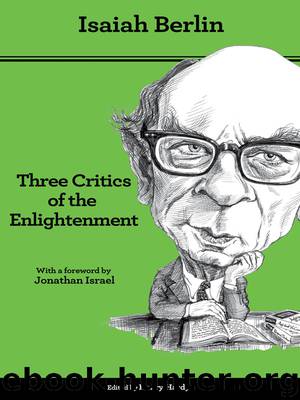Three Critics of the Enlightenment by Berlin Isaiah Hardy Henry Israel Jonathan

Author:Berlin, Isaiah, Hardy, Henry, Israel, Jonathan
Language: eng
Format: epub
Publisher: Princeton University Press
Published: 2013-06-18T16:00:00+00:00
VI
In this connection it is worth considering Herder’s attitude to three great eighteenth-century myths which fed the stream of nineteenth-century nationalism. The first is that of the superiority of a particular tribal culture. His denunciation of patriotic boastfulness – the Favoritvolk doctrine – has already been referred to. One of the most quoted sentences from Yet Another Philosophy of History tells us that ‘Every nation has its own inner centre of happiness, as every sphere its own centre of gravity.’1 This is what the historian, the critic, the philosopher must grasp, and nothing is more fatal than the attempted assimilation of the Mittelpunkt of one culture with those of others. One must ‘enter the time, the place, the entire history’2 of a people; one must ‘feel oneself into [sich hineinfühlen] everything’.3 This is what contemporary historians (he is referring specifically to Schlözer) conspicuously fail to do.4 To understand Hebrew scripture it is not enough, he tells us, to see it as a sublime work of art, and compare its beauties with those of Homer, as the Oxford scholar Robert Lowth had done; we must transport ourselves into a distant land and an earlier age, and read it as the national poem of the Jews, a pastoral and agricultural people, written in ancient, simple, rustic, poetic, not philosophical or abstract, language. ‘Be a shepherd among shepherds, a peasant in the midst of an agricultural people, an oriental among the primitive dwellers of the East, if you wish to enjoy these creations in the atmosphere of their birth.’5 Germans are not ancient Hebrews; biblical images are drawn from a world alien to them. When the poet of the Bible speaks of the snows of Lebanon or the pleasant vineyards of Carmel, these are empty words to a German poet.1
‘The dreadful storms from the sea passing over their land to Arabia were for them thundering steeds bearing the chariot of Jehovah through the clouds.’2 He says that it would be better for a contemporary poet to sing of electric sparks than copy these Judaean images; for the Bible the rainbow is the footstool of the Lord’s house; for the Skalds it is a fiery bridge over which the giants sought to storm heaven.3 All this is at best only half intelligible to us. The Germans are not biblical Jews, nor are they classical Greeks or Romans either.4 Every experience is what it is. To understand it is to grasp what it meant to those who expressed it in the monuments through which we try to read it. All understanding is necessarily historical. The Aufklärer – Gottsched, Lessing and Moses Mendelssohn – not only lack all historical perspective, they tend to grade, to give marks for moral excellence. Herder, in this (what he would regard as a Spinozan) mood, warns, at any rate in 1774 in Auch eine Philosophie, against moral evaluation (prone though he was to it himself, then and later), and urges the critic to understand above all that if one must
Download
This site does not store any files on its server. We only index and link to content provided by other sites. Please contact the content providers to delete copyright contents if any and email us, we'll remove relevant links or contents immediately.
The remains of the day by Kazuo Ishiguro(8947)
Tools of Titans by Timothy Ferriss(8346)
Giovanni's Room by James Baldwin(7301)
The Black Swan by Nassim Nicholas Taleb(7086)
Inner Engineering: A Yogi's Guide to Joy by Sadhguru(6776)
The Way of Zen by Alan W. Watts(6575)
Asking the Right Questions: A Guide to Critical Thinking by M. Neil Browne & Stuart M. Keeley(5740)
The Power of Now: A Guide to Spiritual Enlightenment by Eckhart Tolle(5724)
The Six Wives Of Henry VIII (WOMEN IN HISTORY) by Fraser Antonia(5485)
Astrophysics for People in a Hurry by Neil DeGrasse Tyson(5169)
Housekeeping by Marilynne Robinson(4420)
12 Rules for Life by Jordan B. Peterson(4292)
Double Down (Diary of a Wimpy Kid Book 11) by Jeff Kinney(4252)
The Ethical Slut by Janet W. Hardy(4232)
Skin in the Game by Nassim Nicholas Taleb(4223)
Ikigai by Héctor García & Francesc Miralles(4219)
The Art of Happiness by The Dalai Lama(4115)
Skin in the Game: Hidden Asymmetries in Daily Life by Nassim Nicholas Taleb(3973)
Walking by Henry David Thoreau(3939)
